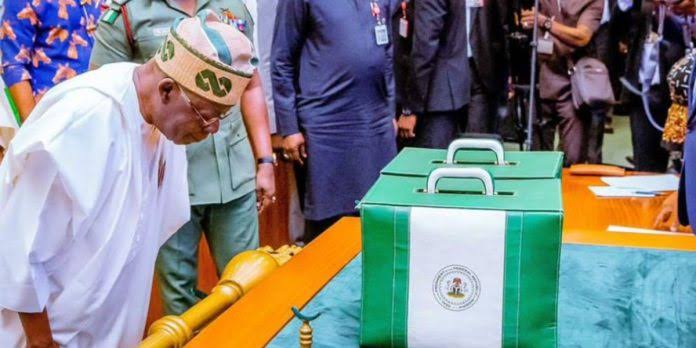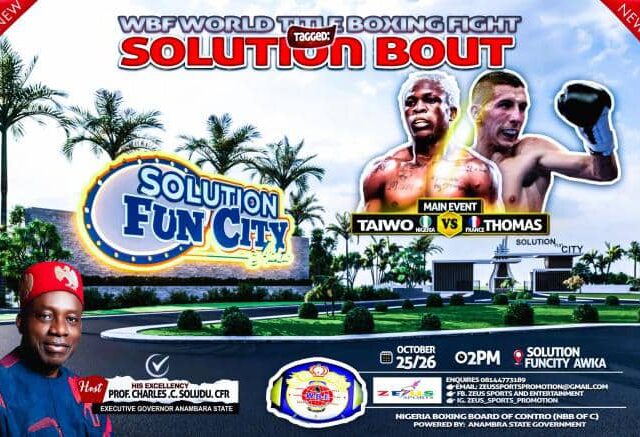- Projects Economic Restoration and Growth
Highlights of the 2025 Budget of Restoration: Securing Peace, Rebuilding Prosperity
- Total Budget: N49.8 trillion (35% increase from 2024 budget)
- Defence and Security: N4.91 trillion to enhance national stability and security infrastructure.
- Infrastructure: N4.06 trillion for key projects in transportation, energy, and communication.
- Healthcare: N2.48 trillion to strengthen the healthcare system and improve services nationwide.
- Education: N3.52 trillion, with significant investment in educational infrastructure, including N826.9 billion for sectoral development
President Bola Ahmed Tinubu earlier today presented Nigeria’s N49.8 trillion 2025 budget, marking a 35% increase from the 2024 budget of N28 trillion.
The budget, dubbed the “Budget of Restoration: Securing Peace, Rebuilding Prosperity,” emphasizes key priorities such as education, healthcare, and security.
Tinubu projects a robust agenda for economic recovery, building on the gains of ongoing reforms while aiming to stabilize the economy and enhance social and physical infrastructure.
Key Economic Indicators and Performance
- GDP Growth: Nigeria’s economy grew by 3.46% in Q3 2024, outperforming projections and demonstrating resilience despite global challenges. This was an improvement over the 2.54% growth in the same quarter of 2023.
- Revenue and Expenditure: By Q3 2024, Nigeria had generated N14.55 trillion in revenue (75% of the full-year target) and spent N21.6 trillion (85% of the target). For 2025, government expenditure is projected at N47.9 trillion, with N15.8 trillion allocated for debt servicing. Revenue is expected to reach N34.82 trillion, creating a deficit of N13.08 trillion, or 3.89% of GDP.
- Foreign Reserves & Trade: Nigeria’s foreign reserves stand at nearly $42 billion, providing a solid buffer against external shocks. Additionally, the country recorded a trade surplus of N5.8 trillion, supported by rising exports.
Strategic Focus Areas for 2025
- Macroeconomic Stability: Tinubu emphasized the need to restore stability and foster inclusive growth through targeted fiscal stimulus and reforms to reduce inflation and improve the business climate.
- Inflation and Exchange Rates: The administration aims to reduce inflation from 34.6% to 15% by 2025 and improve the exchange rate from N1,700 to N1,500 per US dollar.
- Crude Oil Production: The 2025 budget is based on a crude oil production target of 2.06 million barrels per day, with a focus on increasing exports and reducing production costs.
Sectoral Allocations for 2025
- Security: N4.91 trillion for defense and security to continue strengthening national stability.
- Infrastructure: N4.06 trillion for infrastructure development, including key projects in transportation, energy, and communications.
- Healthcare and Education: N2.48 trillion for healthcare and N3.52 trillion for education. Notably, N826.9 billion will be dedicated to the educational sector, including support for universal basic education and new higher educational institutions.
- Human Capital Development: With a focus on youth empowerment, the budget seeks to boost human capital development, including investments in vocational training, education, and healthcare.
Positive Economic Trajectory
President Tinubu underscored that the economic reforms already underway are beginning to show tangible results. He highlighted the steady recovery in key areas such as security, trade, and infrastructure, with increasing exports and a stable fiscal outlook. These achievements are seen as early indicators of Nigeria’s return to economic stability.
Legislative Support and National Outlook
Both Senate President Godswill Akpabio and Speaker of the House of Representatives Tajudeen Abbas commended the President’s bold reforms, particularly in addressing the country’s economic challenges.
Akpabio praised the President’s efforts in rebuilding Nigeria’s economy, improving security, and enhancing international recognition. Abbas, meanwhile, highlighted the importance of the tax reforms for equitable revenue collection and urged further study of the proposed reforms to ensure they benefit the most vulnerable Nigerians.
President Tinubu’s 2025 budget sets an ambitious yet crucial roadmap to rebuild Nigeria’s economy, focusing on restoring macroeconomic stability, bolstering key sectors, and fostering inclusive growth for a brighter future.








It’s hard to search out educated people on this topic, however you sound like you already know what you’re talking about! Thanks